Thank you for joining uspublished at 18:16 GMT 25 January 2020
We will bring you all the latest developments next week as the trial continues.
And here's the news story telling you what unfolded on Saturday
The third impeachment trial in US history continued as Trump's lawyers launched their defence
They wrapped up after two hours and have now adjourned to continue on Monday
They began by accusing the Democrats of wanting to undo the 2016 election
"They have the burden of proof and they have not come close to meeting it," said Pat Cipollone
House Democrats have already presented their case for Trump's removal from office
He is accused of seeking help from Ukraine to help get himself re-elected and of obstructing Congress
He has dismissed the probe as a "hoax" and a "witch-hunt"
Holly Honderich, Kelly-Leigh Cooper and Tom Geoghegan
We will bring you all the latest developments next week as the trial continues.
And here's the news story telling you what unfolded on Saturday
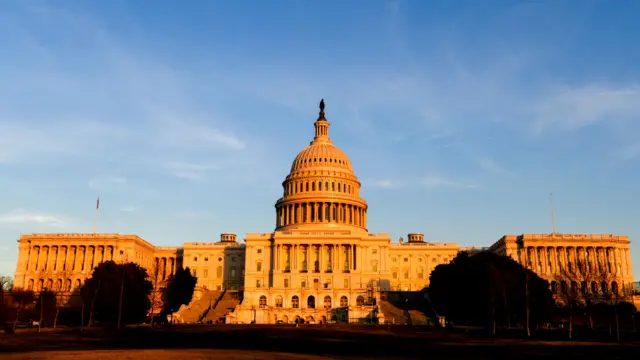 Image source, Getty Images
Image source, Getty ImagesOn Monday and Tuesday, Trump's lawyers can continue their arguments.
They may choose not to take all that time, however.
The next stage is written questions submitted from and to either side under the guidance of Chief Justice John Roberts.
That's when we expect the debate over the inclusion of witnesses and evidence to really ignite.
Democrats want to broaden the scope of the trial to include testimony from the likes of John Bolton, who was national security adviser and reportedly deeply unhappy about the president's Ukraine policy. One official testified under oath that Mr Bolton called it a "drug deal".
It would require four Republican senators to join the Democrats in a vote to force witnesses to be called.
We've heard a lot from lawmakers throughout the impeachment probe into President Trump. But what do Americans think?
According to a poll from Pew Research Center released this week, it's not looking great for Trump.
Slightly more Americans now say that he should be removed from office.
51% of Americans say the president should be removed by the Senate trial, while 46% say Trump should stay.
These results are starkly divided along partisan lines: 85% of Democrats think Trump should be kicked out while 86% of Republican voters think he should stay.
The country is more united when it comes to Trump's alleged wrongdoing.
63% of Americans say Trump has "definitely" or "probably" done something illegal.
An even larger majority - 70% - say he has "definitely" or "probably" done something unethical.
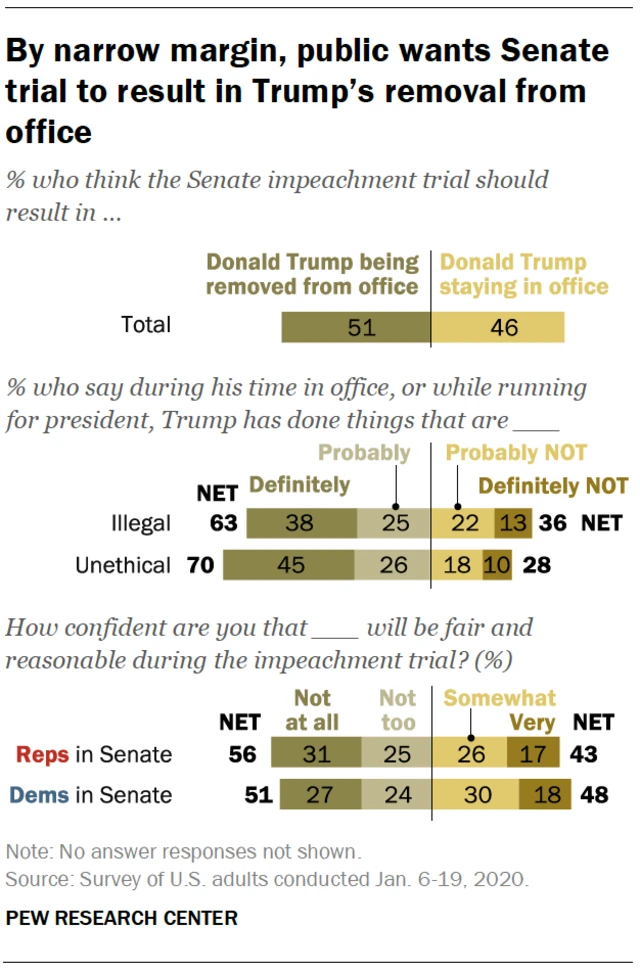 Image source, Pew Research Center
Image source, Pew Research CenterHere are the main planks of the two hours of arguments by Trump lawyers:
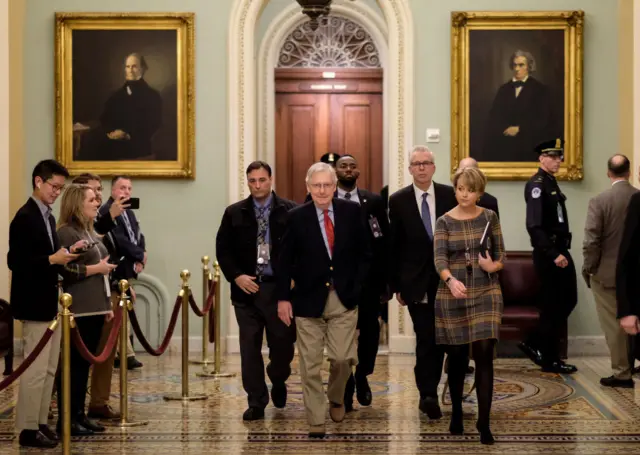 Image source, Alex Wroblewski/Getty Images
Image source, Alex Wroblewski/Getty ImagesSenate Majority Leader Mitch McConnell before today's hearing
It was clear that Trump was unhappy with the Saturday afternoon time slot originally assigned to his team - "Death Valley in TV", he said.
And haste was a recurring theme on Saturday - every member of Trump's team to speak on the Senate floor promised the proceedings would be quick.
They delivered - after just more than two hours, the president's lawyers wrapped up proceedings, adjourning until 1300 local time on Monday.
Trump's lawyer Jay Sekulow, has denied that bad TV ratings had anything to do with the way the day was shortened and moved to the morning, insisting the issue was getting senators back to their districts.
At this point, with just two days left to spend the remaining 22 hours of allotted time, it seems unlikely that Republicans will make use of every minute, in a clear contrast from the Democratic House managers.
Either way: Republicans seem committed to their plans for a speedy trial and, most likely, a speedy acquittal of the president.
After little more than two hours, Trump's defence team has adjourned proceedings until Monday at 1300 local time (1800 GMT).
The strict no-talking, no-tweeting rules within the chamber no longer apply so lawmakers are weighing in.
Trump's team "don't contest the facts of Trump's scheme," writes top Democrat Adam Schiff.
"They're trying to deflect, distract from, and distort the truth."
The Republicans on the House Oversight Committee had a different take: "Game over, @RepAdamSchiff," they said.
Allow X content?
This article contains content provided by X. We ask for your permission before anything is loaded, as they may be using cookies and other technologies. You may want to read X’s cookie policy, external and privacy policy, external before accepting. To view this content choose ‘accept and continue’.
Allow X content?
This article contains content provided by X. We ask for your permission before anything is loaded, as they may be using cookies and other technologies. You may want to read X’s cookie policy, external and privacy policy, external before accepting. To view this content choose ‘accept and continue’.
 Image source, Getty Images
Image source, Getty ImagesChuck Schumer (pictured above), the Senate minority leader, said the president's defence team had "gaping holes in their testimony" and did not do a "very good job" in their presentation.
He also said their arguments, about a lack of evidence close to the president, actually bolstered the Democrats' arguments for subpoenaing witnesses and documents.
"Don't bury your head in the sand and then complain about being dark," he added.
Many believe it's a foregone conclusion that Mr Trump - who denies the charges - will be acquitted at the end of this process because his party controls the Senate.
It's like going to see a film where you think you know the ending.
Yet there still could be a point of tension next week after the Trump lawyers end their arguments, because the issue of witnesses will come up.
Anthony Zurcher, BBC North America reporter, explains below how events could yet diverge from the script.
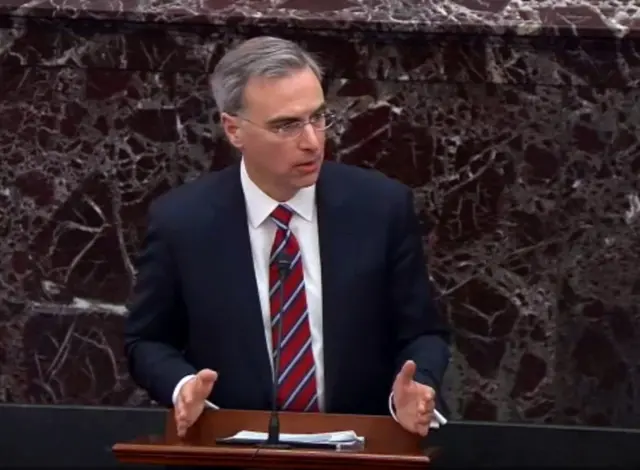 Image source, US Senate via Getty
Image source, US Senate via GettyThe president's team just wrapped up their first day of defence - an hour earlier than expected.
Far from the mammoth testimony we saw earlier this week, Saturday turned out to be a quick two-hour affair.
In his final remarks, White House Counsel Pat Cipollone criticised the impeachment prosecutors' calls to remove President Trump from office.
He told senators it would be "irresponsible abuse of power to do what they're asking you to do".
"To stop an election? To interfere in an election and remove the president of the United States from the ballot? Let the people decide for themselves," he concluded. "That's what the founders wanted, that's what we should all want."
The defence is expected to resume at about 13:00 local time (18:00 GMT) on Monday after a brief weekend break.
Trump and Clinton's impeachment - what's different now?
The last president to be impeached was Bill Clinton, in 1998.
The BBC's Nick Bryant covered Clinton's trial, now more than 20 years ago.
"We were watching a process play out that hadn't been seen since the mid 19th Century. It was a constitutional civics lesson and tawdry daytime soap opera all in one." Bryant says.
This is the key difference, Bryant explains. This time around, Trump's impeachment feels less dramatic, somehow less of a historical moment.
The US is "a scandal weary country, with a scandal prone presidency," he says. "This feels in some ways like another week in Trumpland."
Watch Nick review the Clinton impeachment and explain how it compares to Trump's.
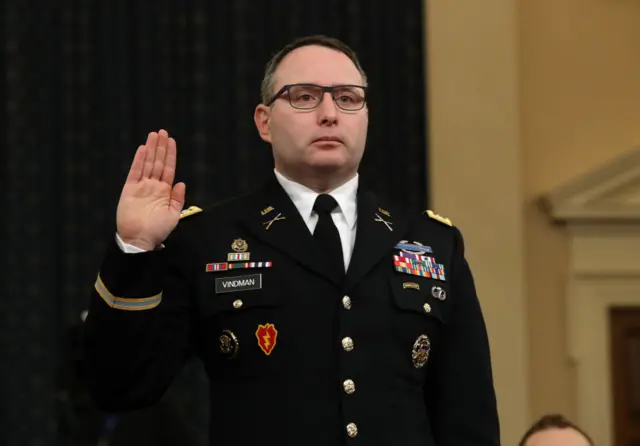 Image source, Chip Somodevilla/Getty Images
Image source, Chip Somodevilla/Getty ImagesAlexander Vindman is sworn in to testify before Congress last year
Democrats have rushed to the defence of Lt Colonel Alexander Vindman - one of the key witnesses in the impeachment probe when it went through the House - in the face of attacks from Republican Senator Marsha Blackburn.
In a series of tweets, the freshman lawmaker made an unsubstantiated claim that Vindman had leaked information of Trump's 25 July call with the Ukrainian president.
"How is that not vindictive?" the Tennesse Republican wrote.
She continued: "Adam Schiff is hailing Alexander Vindman as an American patriot. How patriotic is it to badmouth and ridicule our great nation in front of Russia, America’s greatest enemy?"
Now, in the midst of Trump's trial, Senate minority leader Chuck Schumer joined a chorus of Democrats rushing to defend Vindman.
"He does not deserve these disgraceful attacks for defending the Constitution," he wrote, calling on the US Department of Defense to protect the veteran.
Vindman is the recipient of a Purple Heart, a US military decoration awarded in the name of the president to those wounded or killed while serving. He was wounded by a roadside bomb in Iraq in 2004.
He testified before Congress in November that he believed Trump's 25 July call was "inappropriate," and he knew "without hesitation" that he had to report it.
Allow X content?
This article contains content provided by X. We ask for your permission before anything is loaded, as they may be using cookies and other technologies. You may want to read X’s cookie policy, external and privacy policy, external before accepting. To view this content choose ‘accept and continue’.
President Trump's personal lawyer, Jay Sekulow, brought a copy of the Mueller report with him to the stand. He used the document to accuse Democrats of trying to re-litigate the Russia investigation during the impeachment case.
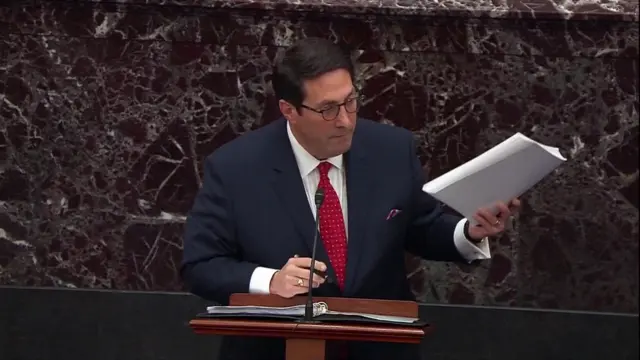 Image source, US Senate via Reuters
Image source, US Senate via Reuters"Let me tell you something," he said, holding the report up. "This cost $32m, this investigation took 2,800 subpoenas. This investigation had 500 search warrants. This had 200 orders for communication records. This had 500 witness interviews. All to reach the following conclusion: 'This investigation did not establish that the campaign coordinated or conspired with the Russian government with its election interference activities.'"
Special Counsel Robert Mueller's investigation did not find enough evidence to establish a criminal conspiracy between the Trump campaign and Russia to influence the election. But he did say the Trump's campaign expected to benefit from Russian hacks against opponents.
It also cited 10 instances of potential obstruction of justice by the president.
We're halfway through the day's proceedings so let's give you the big picture here.
Trump was impeached on 18 December on allegations he abused his power and obstructed Congress. That means he was charged.
This is not a criminal process but he now he faces a trial in the Senate over whether he should be removed from office.
The abuse of power charge centres on the allegation he pressured Ukraine's leader to dig up damaging information on a political rival, Joe Biden, and whether he withheld vital military assistance to do it.
Democrats also accuse him of obstructing the work of Congress in investigating all this, by blocking documents sought by the impeachment inquiry, and banning members of staff from co-operating.
The 100-seat Senate is controlled by 53 Republicans, making it highly unlikely that Trump will be voted out of office, because conviction requires a two-thirds majority.
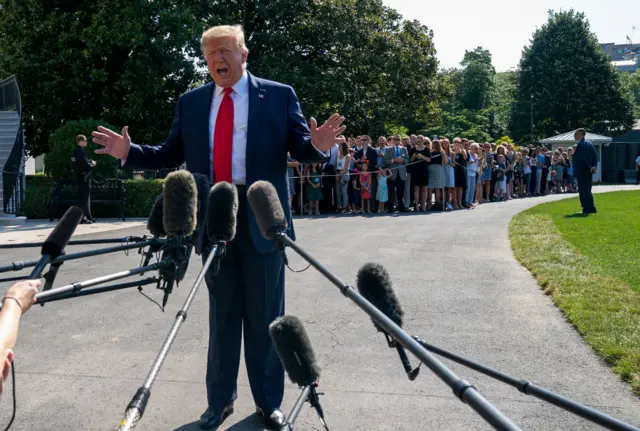 Image source, Tasos Katopodis/Getty Images
Image source, Tasos Katopodis/Getty ImagesThe president has repeatedly called the impeachment process a sham
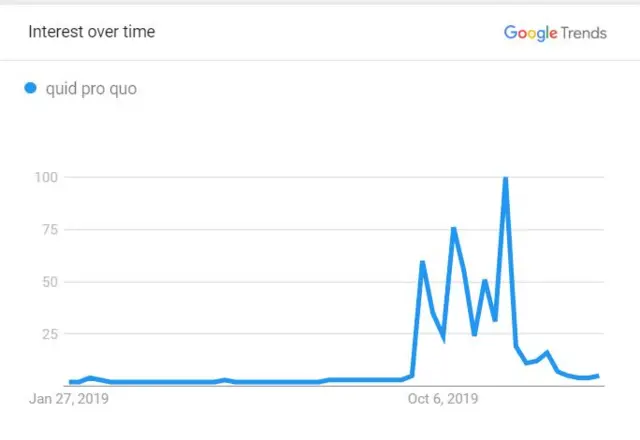 Image source, Google Trends
Image source, Google Trends"Quid quo pro" has become a sticking point in Trump's impeachment trial.
So what does it mean?
It translates from Latin as "something for something".
The Democrats' argument for impeachment hinges on an alleged quid pro quo between Trump and Ukraine.
They say the "something for something" in this case was a White House visit and security aid - sought by Ukraine - in exchange for an investigation into Joe Biden and pinning 2016 election interference on Ukraine, not Russia.
Trump's team insists no such exchange took place.
But Americans are certainly interested in the phrase.
Searches for "quid pro quo" in the US began to surge in September 2019 - just when the move towards Trump's impeachment began in earnest.
Trump impeachment: What's Ukraine got to do with it?
A lot, according to Jay Sekulow, Trump's personal lawyer.
Sekulow, one of the leaders on the president's defence team, is on the Senate floor arguing that Trump and his deputies were committed to rooting out corruption in Ukraine.
So while all the wrangling between Democrats and Republicans over this case marches on in Washington, the reason Mr Trump has been impeached lies thousands of miles away on another continent.
Paul Adams, BBC diplomatic correspondent, has been to Ukraine to find out why it is so closely-linked to the Trump trial.
Why so few images from inside the room?
Well, there are no news photographers allowed inside the Senate chamber for the trial so the only photos you see of the action on the floor are screengrabs from broadcasted footage.
Here are some images of the area around the chamber, before proceedings got started.
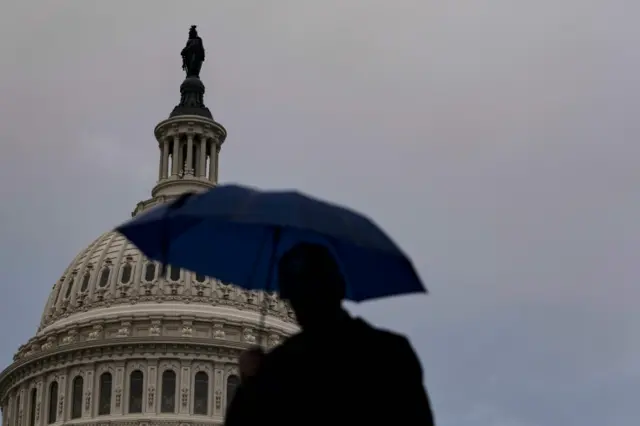 Image source, Getty Images
Image source, Getty ImagesIt's a wet day in Washington
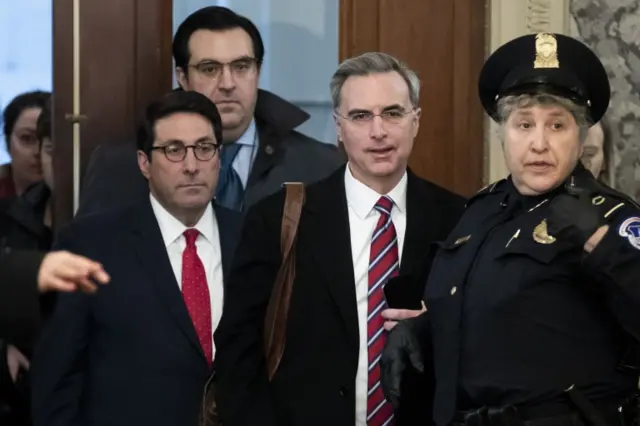 Image source, EPA
Image source, EPAMr Trump's lawyer Jay Sekulow and White House Counsel Pat Cipollone arrive before taking centre stage
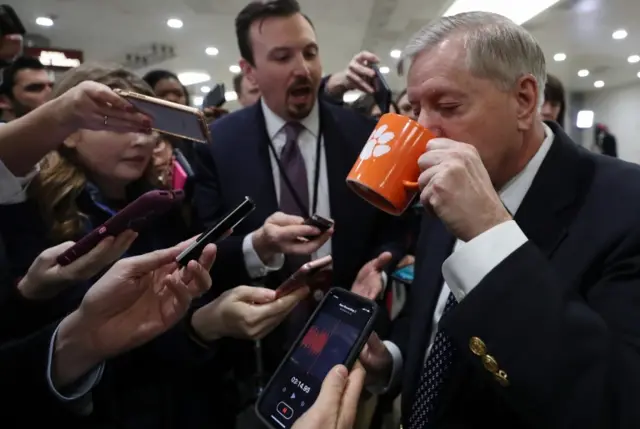 Image source, Getty Images
Image source, Getty ImagesSenator Lindsey Graham, who was a key figure in the Clinton impeachment, was flanked by journalists
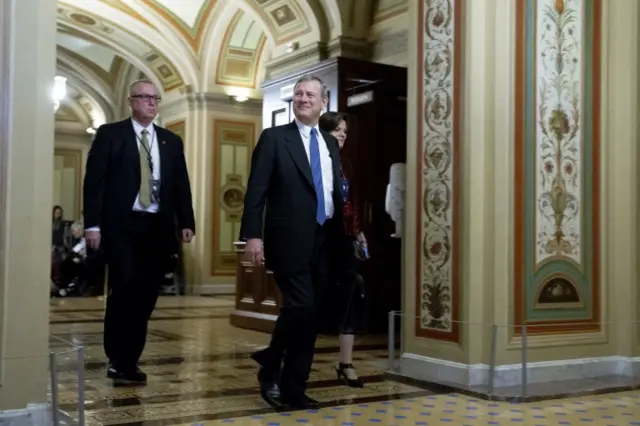 Image source, EPA
Image source, EPAChief Justice John Roberts, who is presiding over the trial, seen arriving on Saturday
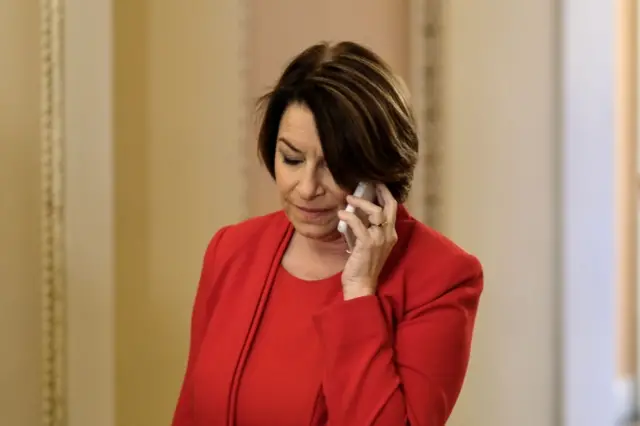 Image source, Getty Images
Image source, Getty ImagesSenator Amy Klobuchar is one of several Democratic hopefuls who will be watching on
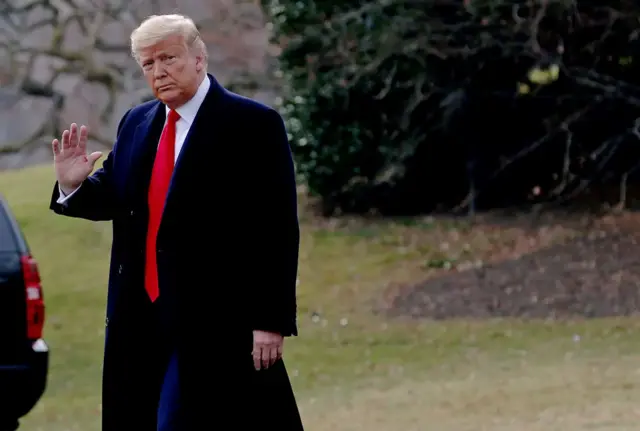 Image source, Getty Images
Image source, Getty ImagesTrump defence lawyer Mike Purpura is taking aim at another key element of the Democrats' argument - the alleged quid pro quo between the president and Ukraine.
The phrase means to exchange favours (we will have more on how these three words exploded in use a little later).
Democrats insist there was a quid pro quo - a White House visit for the Ukrainian President Zelensky was directly conditioned on opening investigations that could help the president politically. And there was also military aid for the Ukrainian conflict with Russia also being dangled, they allege.
Purpura says no.
"Zelenksy felt no pressure. Presisdent Zelensky says he felt no pressure. The House managers tell you they know better," he says. The Democrats "are saying that president z and his top advisers are being untruthful".
"Tell me how that helps US foreign policy and national security to say that about our friends?."

Need to catch up with all things Trump impeachment? We’ve made it easy for you.
WHAT HAPPENED THIS WEEK: Here's a recap on the trial so far
FIVE POSSIBLE TWISTS: Think it's a foregone conclusion? Perhaps not
SIMPLE GUIDE: If you want a basic take on what's going on
GO DEEPER: Here's a 100, 300 and 800-word summary of the story
IMPEACHMENT QUESTIONS? We’ve got answers
CONTEXT: Why Ukraine matters to the US
Some senators were accused of playing games and even falling asleep during the prosecution's lengthy presentations earlier this week.
Fidget spinners, paper planes and even crossword puzzles were spotted in the chamber. And some senators were also criticised for wandering out for breaks or even television interviews.
There are supposed to be strict rules about conduct during the impeachment trial, including no talking, no electronics and no snacks allowed in the chamber (unless from a designated draw of candy/sweets).
Read more on how the senators wiled away the time
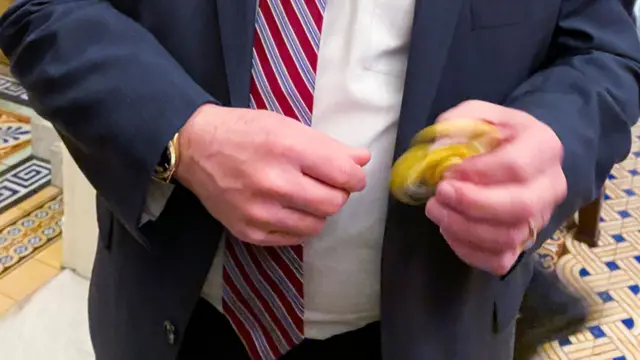 Image source, Reuters
Image source, ReutersRepublican Senator Mike Rounds shows his fidget spinner to reporters
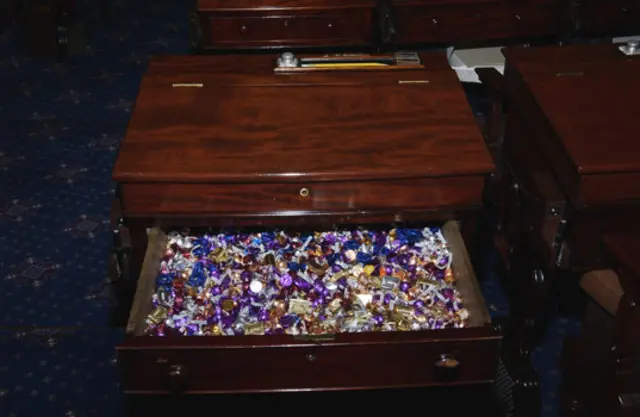 Image source, US Senate
Image source, US SenateThe Senate 'candy desk' for peckish politicians has been a tradition since the 1960s
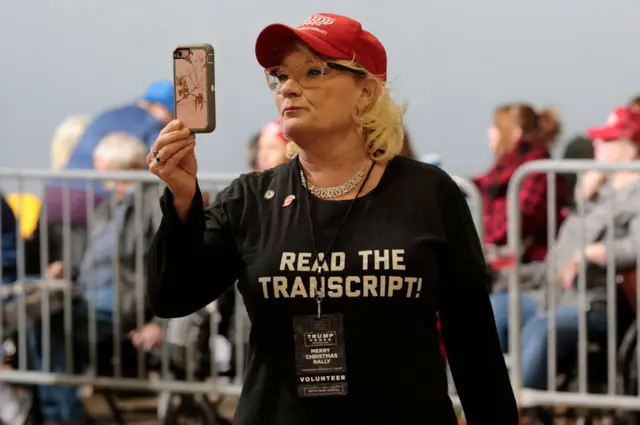 Image source, AFP
Image source, AFP'Read the transcript' has become a feature at Trump rallies
Mike Purpera, Deputy White House Counsel, is making the president's case to the Senate.
So far, he's sticking to the subject of the now-infamous 25 July call between President Trump and his Ukrainian counterpart, President Zelensky.
"Read the transcript" is now a common refrain among Trump and his supporters, and Purpera is making the same argument now.
Purpera says that this call effectively exonerates the president, pinpointing a particularly contentious line, in which Trump asks Zelensky to "do us a favour".
Democrats say the call is damning in itself, as it clearly shows Trump was looking for a personal favour to have Ukraine investigate Joe Biden.
Purpera disagrees.
The "us" here refers to the United States, he says, insisting Trump was looking out for US national interests.
Want to know more about the call?
Read the BBC's Anthony Zurcher's analysis on how an overheard phone call could damage Trump.
 Anthony Zurcher
Anthony Zurcher
BBC North America reporter
While the Democratic presentation was an endurance test, the Trump team's defence promises to be a much leaner affair. They benefit from starting with a commanding lead in the Senate vote count and, in effect, only need to provide a modicum of cover for their party faithful.
Up until now, their strategy has been to offer a wide array of defences, allowing Republicans to pick and choose what to use. As with any trial, the burden is on the prosecution to construct a cohesive compelling narrative, while the other side need only poke holes and find weaknesses.
Trump's lawyers promise to present a "robust" defence, which will probably include going on the attack - against Democrats and their motivations and against Joe Biden and his family. While they have the unfortunate luck of starting their case on a Saturday morning, by the beginning of next week they will have a much bigger audience and, at least in this round, the final word.